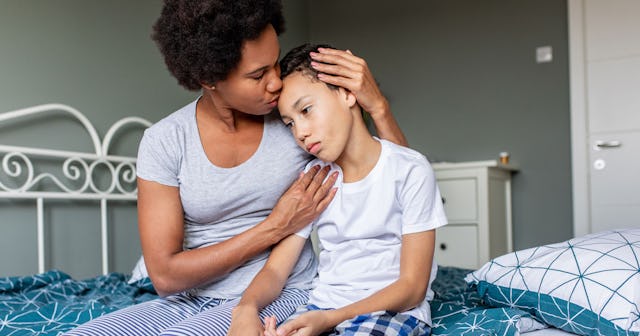Our Kids' Mental Health Is In A State Of Emergency

Mental health is health, full stop. So it’s no wonder that the US Surgeon General’s newest advisory is making headlines.
Last week Surgeon General Dr. Vivek Murthy issued an advisory highlighting an urgent need to address the nation’s youth mental health crisis. Honestly, the only surprise is that it took this long for the crisis to be recognized on a national level.
COVID, and everything that came with it, turned the entire world upside down. While we can’t go back in time and change things, we can understand what impacts children’s mental health, and how we as parents can support their well-being.
What Are ACEs And What Role Do They Play In Our Children’s Mental Health?
Have you ever heard of the acronym ACE? It stands for adverse childhood experiences, which is a term coined by pediatric health specialists. And yes, the pandemic counts as one of them.
Pediatrician Nadine Burke Harris tells Scientific American: “Adverse experiences activate the brain’s fight-or-flight system, which is a normal response to immediate danger.” And yet, the pandemic has been going on for almost two years. So what does that impact look like? “Repeated exposure to these situations extends their stress response and creates damage,” adds Harris.
Even before COVID, our kid needed much more support for their mental health than they were getting. In fact, according to the Department of Health and Human Services, “Mental health challenges are the leading cause of disability and poor life outcomes in young people. Up to 1 in 5 children ages 3 to 17 in the U.S. have a mental, emotional, developmental, or behavioral disorder.”
Yes, kids are resilient. But, in the end, they are still human. As much as COVID impacted adults and their mental health, the same can be said for kids as well. But the difference between the adults and the kiddos? We’re grown. Of course, we don’t have it all figured out, but we have decades of experience coping with loss and understanding the importance of grieving. Many children lost a grandparent, a parent, or a caregiver of some sort over the last 20 months. Not to mention their sense of normalcy, whether that involved not being able to see their friends at school or missing out on activities promoting their social and emotional development.
How Can We Support Our Kiddos?
The Surgeon General’s Advisory on Protecting Youth Mental Health gives us a few places to start.
Recognize mental health is an important part of overall health
Are you tired of hearing us say this? If they fell and broke a bone, you wouldn’t tell them to get over it and move on. Apply the same logic and care with their less-visible pain as well.
Empower kids to recognize, manage, and learn from difficult emotions
It breaks every parent’s heart to see their child suffer. While it’s hard to watch them go through it, it’s equally important to encourage them to recognize that sometimes things are going to feel impossible. By acknowledging these feelings, you support their ability to manage and learn from them.
Acknowledge economic and social barriers that contribute to poor mental health
It’s uncomfortable, but it is also a fact that people who have the privilege of economic security have more time and resources to dedicate to their children’s mental health. This concept is best illustrated by Maslow’s hierarchy of needs, the most pressing category of need being physiological — so basically, shelter and sustenance.
If a family is food-insecure, for instance, perhaps their child’s mental health isn’t as dire a problem as some of the other challenges they face.
Instead of telling someone to toughen up, work harder, or just get over it, hold space for people who face different barriers than you. Because at the end of the day, we’re all just trying to navigate through whatever life throws at us and support our kids as they do the same.
This article was originally published on